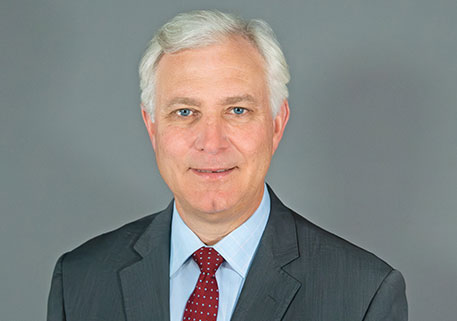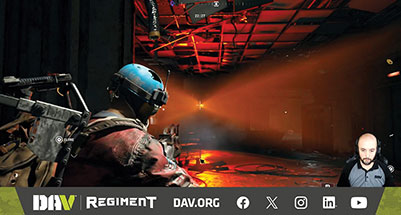
DAV helps Navy veteran, male sexual assault survivor access VA benefits
It was supposed to be a celebratory weekend. Navy veteran Michael Stern had returned from an exhausting surge deployment to Somalia a few months prior and was looking forward to ringing in his 25th birthday on a three-day liberty pass.
What unfolded, however, changed Stern’s life forever. A man he had met that Friday night persuaded Stern to go to his house, a captivating home in an upscale neighborhood of Norfolk, Va. By the next morning, that man, a Navy ensign, had sexually assaulted Stern, setting in motion a cascade of events that ended his time in the military.
While military sexual trauma is often more commonly associated with women, up until 2018, more men reported experiencing MST than their female counterparts, according to advocates. Stern was just one of the nearly 81,000 male veterans who reported experiencing MST when seeking VA care last year.
The morning following the assault, Stern was unsure if he had been drugged—a question he has to this day—in addition to drinking. He said the attack was like having an out-of-body experience.
“I didn’t have any control, and it was almost like I was watching it on TV,” he said. “The last thing I remember is him telling me that if I told anyone about this, he would report me and have me kicked out.”
That was in 2008, when the military adhered to the now-ended “don’t ask, don’t tell” policy, which barred homosexuals and bisexuals from openly serving in the armed forces. Despite being a survivor, Stern was worried about potential punishment under the Uniform Code of Military Justice.
To help process the assault, he walked along the beach, wrestling with two possible paths forward—reporting it to his command or ending his own life.
Ultimately, Stern chose to report. After his chain of command was notified, he underwent a medical examination, but by then, any substances he may have unintentionally consumed had likely been flushed out of his body and any DNA left by his assailant had already been washed away.
Before receiving mental health care for the assault, according to Stern, he was required to enroll in a 30-day inpatient alcohol treatment program on base. To Stern’s outrage, the civilian staff facilitating the treatment program told him it was his fault since he had been drinking.
“Yeah, I was drinking, but it’s my fault because of that?” he said. “That’s not right.”
He plunged into a steep decline. To add insult to injury, the day he reported back to the USS Whidbey Island, a dock landing ship, Stern found gay pornography placed in his rack as a joke by other sailors. He sank even deeper into depression and anxiety, which wreaked havoc on his conduct.
Over the course of the next few months, he had fought a noncommissioned officer and was reassigned to another department. But the final blow to his military career was an arrest for driving under the influence. In 2009, after four years of service, including deployments to the Middle East and the Horn of Africa, the Navy separated Stern—officially—for failing alcohol rehabilitation.
Stern suspects, however, it was also retaliation for reporting his assault.
Such retribution is not uncommon, according to retired Col. Don Christensen, former chief prosecutor in the Air Force’s Judge Advocate General’s Corps and current president of Protect Our Defenders, a nonprofit working to eradicate sexual assault in the military.
“There’s a culture of disbelief and culture of shaming in the military surrounding sexual assault,” said Christensen. “And they’re just not changing it.”
Christensen, who has experience prosecuting dozens of sexual assault cases in the Air Force, points to the Pentagon’s track record of providing justice. Despite a more than 20% increase in sexual assault reports since 2015, convictions have taken an almost 60% nosedive. According to the Defense Department’s Sexual Assault Prevention and Response Office, between 2016 and 2019, 64% of women survivors reported some retaliation after reporting an assault. When retribution was reported, two-thirds of alleged retaliators were in the affected service members’ chain of command.
Survivors of MST also tend to skew young. They are often lower in rank and feel powerless to battle against their chain of command, which is sacrosanct in the military. This leaves the most vulnerable exposed to some of the most significant flaws in the entire military justice system, according to some advocates.
The Department of Veterans Affairs, on the other hand, gets a passing grade from Christensen in its ability to provide resources for survivors.
“The services VA provides [for MST survivors] are getting better, but we definitely see, with male survivors especially, there’s a long way to go,” he added.
There are signs that the VA is improving. The grant rate for men claiming post-traumatic stress disorder from MST was just 27% in 2011, advocates told lawmakers earlier this year. The figure has risen to nearly 47% but is still trailing that of women, who receive a favorable claim about 58% of the time.
“We know as advocates that MST is not gender-specific, but it can be difficult to see that from the outside,” said National Legislative Director Joy Ilem. “That’s why it’s so incredibly important to shed light on the facts so the people responsible for facilitating health care, making claims decisions, and allocating resources for treatment and programs can adequately meet the unique needs of those who have been affected.”
Stern began to seek VA benefits and care in recent years but found it difficult to join a male MST group at a nearby VA medical center, even with the assistance of a VA counselor. One program at the VA medical center in Palo Alto, Calif., only accepts patients who are enrolled at that specific facility. Another in Bay Pines, Fla., had a six-month waiting list, and Stern needed something more immediate.
He received treatment through a general PTSD program at the VA hospital in Cincinnati, completing treatment in January. He ultimately entered the Road Home Program at Rush University in Chicago. The intense 21-day group and individual program allows prospective veterans to self-refer, meaning a doctor’s recommendation isn’t necessary.
“If you’re not currently being seen or treated, it can be really hard to get into one of these programs without the chance to self-refer,” Stern added.
While Stern said he’s now on a much better track thanks to treatment, the 11 years since he left the Navy has been marred by chaos, isolation and struggles with mental health—including attempted suicide.
Years passed before he could utter a word about his assault, and Stern felt like a VA claim was out of the question. He had a common misconception within the veteran community that if he were to file for benefits he had earned in service, he would be taking them away from another, more deserving veteran. But that belief changed in 2017 when he moved to Utah and met DAV National Service Officer Derek Norman.
“A buddy said he had a friend out this way who was in a really dark place,” said Norman. “He was suffering from PTSD and needed somebody to reach out to him.”
The two met for the first time the next day and quickly became friends.
Stern finally thought the time was right to submit a VA claim for PTSD due to MST. The claim was approved, but not to the degree that reflected the level of his trauma. He turned to DAV, and now his friend and confidant, Norman, is seeking a rating increase.
“He’s still in a tough spot, but I’ll always be there for him,” added Norman, “not only as a friend but to guide him through his VA benefits and health care.”
Stern remains optimistic about the future. He currently lives in Ogden, Utah, and is looking forward to using the experience he gained as a Navy hull technician for a machinist job he plans to start soon.
“It’s not the end of your life; there are still good things to come,” explained Stern. “You can recover from MST. It’s work, and it’s difficult, but there are people out there who will help you.”





